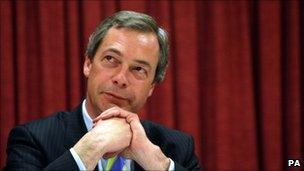UKIP stance on Europe 'becoming mainstream'
- Published

Nigel Farage said there was widespread anger about the lack of a referendum on the Lisbon Treaty
The UK Independence Party begins its annual conference on Friday, with leader Nigel Farage arguing that rival parties are hardening their stance towards the European Union.
He told the BBC that UKIP, which wants Britain to leave the EU, was making its cause more "mainstream" among Labour and Tory MPs via its campaigning.
The conference, taking place in Eastbourne, lasts until Saturday.
Former Conservative MP Neil Hamilton is among the scheduled speakers.
The ex-minister, who lost his seat in 1997 following the "cash-for-questions" scandal, announced last week that he was joining UKIP and is seeking election to its national executive.
A UKIP spokesman said Mr Hamilton's actions were those of a "proper Conservative, who is concerned about his country's relationship with the EU".
Timo Soini, leader of the Eurosceptic True Finns Party, which gained 19% of the vote at Finland's general election in April, will also address delegates.
'Broad campaign'
But UKIP, whose conference takes place at Eastbourne's Congress Theatre and Winter Gardens, is keen to be seen as more than a "single-issue" party. Other issues on the agenda include defence, education and housing.
A spokesman said: "UKIP is broadening its campaign. There's more to the party than our policy of wanting to withdraw from the European Union and we will show that."
The conference comes amid reports that Eurosceptic Tory backbenchers are planning cross-party discussions with like-minded Labour MPs about reshaping the UK's relationship with the EU.
Mr Farage, who will deliver his keynote speech on Friday afternoon, said his party deserved some of the credit, telling BBC 5 live: "I'm delighted. I think that it's UKIP going in there, softening up the ground, turning round the argument.
"We have a mainstream campaign that's allowed other parties to discuss it."
Second stint
UKIP is demanding a referendum on whether Britain should stay in the EU.
Mr Farage said there was "much anger" around the country at the failure of the other parties to hold one over the ratification of the Lisbon Treaty, which created an EU foreign policy chief and a permanent president of the European Council.
UKIP says there should still be a free trade agreement with other European countries, without the existing political links.
Mr Farage, who is in his second stint as leader, stood down before the last general election in a failed bid to win a Westminster seat, but regained the job in last year's leadership contest.
In May, one of the party's Euro MPs, Marta Andreasen, called for him to quit for a second time, arguing he had "abjectly failed" to bring about a breakthrough in local elections in England.
The party dismissed this demand as "eccentric and naive".
It comes as former UKIP MEP Nikki Sinclaire, who now sits as an independent after a bust-up with the party over its alliance with Italy's Liga Nord party, hands in a 100,000 name petition to Downing Street calling on David Cameron to hold an "in or out" referendum on EU membership.
Ms Sinclaire, who was due to be accompanied by Labour MPs Kelvin Hopkins, Austin Mitchell and Kate Hoey, said "dozens" of the signatories were MPs, many of them Tories.
UKIP came second to the Conservatives at the 2009 European Parliament elections.
- Published7 September 2011
- Published10 May 2011
- Published5 March 2011